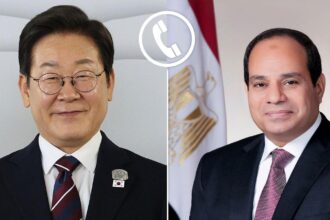By Heba Fahmy
CAIRO: While experts hailed an Al-Azhar document issued last month, labeling it a step toward restoring the Islamic institution’s status, they expressed some reservations during a press conference Wednesday.
Scholars said the document should include rights of atheists and beliefs other than Christianity and Judaism, while others criticized the document for stripping Egypt of its Islamic identity. Others saw it as granting the Al-Azhar undeserved authorities.
The International Center for Future and Strategic Studies (ICFS) held a press conference discussing the pros and cons of a document issued by Al-Azhar and a number of Egyptian intellectuals defining “the relationship between Islam and the state in this difficult phase.”
The document called for a “modern, democratic” and secular state in Egypt. Panelists included a number of Azhar sheikhs and experts who evaluated the document.
The idea of a secular state “emerges from Islam,” Ismail El-Deftar, professor of Hadith at Al-Azhar University and member of the Islamic Research Center (IRC), said.
“Al-Azhar has always played a great role in politics and religion in the history of Egypt,” Sheikh Mahmoud Ashour, former deputy of Al-Azhar and member of IRC, added. “It wasn’t isolated or separated from the people.”
On the other hand, Deputy Minister of Religious Endowments for Preaching, Salem Abdel Gelil said that the charter only guarantees the rights of Christians, Jews and Muslims, adding that the rights of Bahai’s and atheists should also be added to the document, according to Islamic legislation.
The document states that the principles of Islamic law would remain “the main source of legislation,” adding that Christians and Jews should have their own tribunals to which they can have recourse.
The document also respects the basic freedoms of opinion and expression, with respect to Judaism, Christianity and Islam.
Professor of political psychology at Ain Shams University Qadri Hefni also stressed guaranteeing atheists’ basic rights, adding that Islamic history and civilization never gagged or prosecuted any atheist for expressing their beliefs and opinions.
He cited a book written in the 1930s under the title “Why I’m an Atheist.” Muslim scholars responded at the time by publishing a book titled “Why I am a Muslim,” without persecuting the writer, Islam Adham.
Former Dean of the Faculty of Islamic and Arabic Studies in Al-Azhar University, Mohamed Abou Zeid harshly criticized the charter, saying he would “rather die than live to see this document see the light.”
“This is the shroud that will cover Al-Azhar before it vanishes,” he said.
Abou Zeid condemned the fact that Al-Azhar “relinquished” Egypt’s Muslim and Arab identity, comparing Egypt to Israel, which he described as a theocratic state.
He added that Islam respects liberals, Christians, Jews and atheists and the majority of the Egyptian people deserve to be respected as Muslims.
“Egypt has been an Islamic and Arab state for over 1,400 years and now they want to take that away,” he said. “How are we going to fight against a state like Israel when we have no identity?” he questioned.
Panelists strongly disagreed, saying that Egyptians can fight for their country based on their nationalism and patriotism, not their religion.
“Many atheists bravely defend their country,” said the executive director of ICFS, Adel Suleiman.
Degree of authority
While Editor-in-Chief of Al-Qahera newspaper Salah Eissa said the charter gave Al-Azhar too much authority, others believed that the charter limited Al-Azhar’s duties as a renowned institution.
Some participants said that Al-Azhar’s role isn’t merely intellectual, but should be involved in social and national issues.
Al-Azhar’s charter states that the Sunni institution is the competent authority and reference in all Islamic affairs, sciences and heritage, adding that it guarantees the rights of others to express their opinions as long as the necessary scientific conditions are available as well as proper dialogue decorum and respecting what is agreed upon by the nation’s Muslim scholars.
Eissa asked who would set these necessary scientific conditions, adding that this point violated freedom of expression and prevented any criticism against Al-Azhar.
“I’m against resorting to Al-Azhar to define the relationship between state and religion,” Eissa added.
“The constitution and the Supreme Constitutional Court are the institutions responsible for defining that relationship,” he added.
El-Deftar stressed that Al-Azhar wasn’t imposing its guardianship over the people, restricting their freedom, according to the charter, but it was merely offering them advice based on its knowledge and expertise.
He quoted Sheikh Mohamed Abdou saying that Islam doesn’t enforce theocratic authority, but instead it enforces the authority to promote virtue and prevent vice.
The document calls for respecting all international conventions and decisions, with respect to the Islamic and Arab traditions and culture.
Abdel Gelil hailed this point, stating that it prevents same-sex marriages.
The panelists stressed that this was an initial draft of the charter, adding that modifications would be made to gain the approval of the public.


